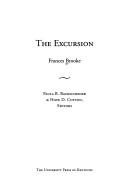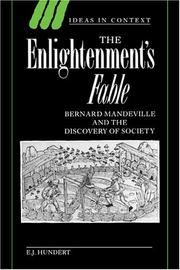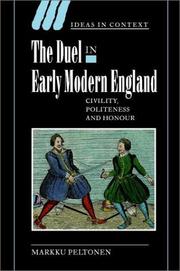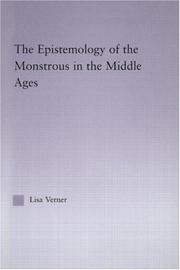| Listing 1 - 10 of 14 | << page >> |
Sort by
|
Book
Year: 1900 Publisher: Project Gutenberg
Abstract | Keywords | Export | Availability | Bookmark
 Loading...
Loading...Choose an application
- Reference Manager
- EndNote
- RefWorks (Direct export to RefWorks)
Book
ISBN: 1283115425 9786613115423 1409417077 9781409417071 9781409414681 Year: 1953 Publisher: London Hakluyt Society
Abstract | Keywords | Export | Availability | Bookmark
 Loading...
Loading...Choose an application
- Reference Manager
- EndNote
- RefWorks (Direct export to RefWorks)
Voyages and travels --- Geography, Medieval. --- Mandeville, John, --- Hungarian language --- Grammar.
Book
ISBN: 1283115417 9786613115416 1409417069 9781315593692 1315593696 9781317101253 1317101251 9781409417064 9781317101260 131710126X 9781317101246 1317101243 Year: 1953 Publisher: London : Ashgate,
Abstract | Keywords | Export | Availability | Bookmark
 Loading...
Loading...Choose an application
- Reference Manager
- EndNote
- RefWorks (Direct export to RefWorks)
Voyages and travels --- Geography, Medieval. --- Geography --- Medieval geography --- Mandeville, John, --- Mandeuile, Iohn, --- Mandevile, John, --- Mandevilla, Juan de, --- Mandevilla, Jean de, --- Mandeville, Johann von, --- Maundevile, John,
Book
ISBN: 1611496047 1611496039 9781611496048 9781611496031 Year: 2016 Publisher: Newark Lanham, Maryland
Abstract | Keywords | Export | Availability | Bookmark
 Loading...
Loading...Choose an application
- Reference Manager
- EndNote
- RefWorks (Direct export to RefWorks)
Mandeville's Travails challenges the less than serious stereotyping of travel as both genre and theoretical framework. Instead, and by examining the position of travel, a deeper sense of the human species can be appreciated beyond the displaced borders of language, ritual, and culture.
Voyages and travels --- Mandeville, John, --- Travel. --- Mandeuile, Iohn, --- Mandevile, John, --- Mandevilla, Juan de, --- Mandevilla, Jean de, --- Mandeville, Johann von, --- Maundevile, John,
Book
Year: 2020 Publisher: Project Gutenberg
Abstract | Keywords | Export | Availability | Bookmark
 Loading...
Loading...Choose an application
- Reference Manager
- EndNote
- RefWorks (Direct export to RefWorks)
Mandeville --- Geoffrey de --- earl of Essex --- -1144 --- Great Britain --- History --- Stephen --- 1135-1154

ISBN: 081315796X 9780813157962 0813119790 9780813119793 0813108810 9780813108810 1322598630 Year: 1997 Publisher: Lexington University Press of Kentucky
Abstract | Keywords | Export | Availability | Bookmark
 Loading...
Loading...Choose an application
- Reference Manager
- EndNote
- RefWorks (Direct export to RefWorks)
Frances Brooke (1724-1789), journalist, translator, playwright, novelist, and even co-manager of a theater, was described as ""perhaps the first female novel-writer who attained a perfect purity and polish of style."" Today, Brooke is known primarily for The History of Emily Montague, one of the earliest novels about Canada, where she lived for a number of years. But it is her third novel, The Excursion, that is an important example of the fashionable and popular English novels of the late 1770s.Written for the very audience it portrays, this novel introduces the heroine, Maria Villiers, to
Book
ISBN: 3319193805 3319193813 Year: 2015 Publisher: Cham : Springer International Publishing : Imprint: Springer,
Abstract | Keywords | Export | Availability | Bookmark
 Loading...
Loading...Choose an application
- Reference Manager
- EndNote
- RefWorks (Direct export to RefWorks)
This books brings together new studies on the thought of Bernard de Mandeville. The chapters reflect a rethinking of de Mandeville’s legacy and, together, present a comprehensive approach to de Mandeville’s work. The book is published on the occasion of the 300 years that have passed since the publication of the Fable of the Bees. Bernard de Mandeville disassembled the dichotomies of traditional moral thinking to show that the outcomes of the social action emerge as new, non-intentional effects from the combination of moral opposites, vice and virtue, in such a form that they lose their moral significance. The work of this great writer, philosopher and physician is interwoven with an awareness of the paradoxical nature of modern society and the challenges that this recognition brings to an adequate perspective on the historical world of modernity.
Philosophy --- Philosophy & Religion --- Mandeville, Bernard, --- Criticism and interpretation. --- B. M. --- De Mandeville, Bernard, --- M., B. --- Mandevilʹ, Bernard, --- Mandeville, B. --- Philosophy. --- History. --- Philosophy and science. --- Philosophy of Science. --- History of Science. --- Science --- Annals --- Auxiliary sciences of history --- Normal science --- Philosophy of science --- Science and philosophy

ISBN: 0521460824 0521619424 0511584741 0511005814 9780511005817 9780511584749 9780521460828 9780521619424 Year: 1994 Publisher: Cambridge Cambridge University press
Abstract | Keywords | Export | Availability | Bookmark
 Loading...
Loading...Choose an application
- Reference Manager
- EndNote
- RefWorks (Direct export to RefWorks)
The apprehension of society as an aggregation of self-interested individuals, connected only by bonds of envy, competition, and exploitation, is a dominant modern concern, but one first systematically articulated during the European Enlightenment. The Enlightenment's 'Fable' approaches this problem from the perspective of the challenge offered to inherited traditions of morality and social understanding by the Anglo-Dutch physician, satirist and philosopher, Bernard Mandeville. Mandeville's infamous paradoxical maxim 'private vices, public benefits' profoundly disturbed his contemporaries, while his Fable of the Bees had a decisive influence on David Hume, Jean-Jacques Rousseau, Adam Smith and Immanuel Kant. Professor Hundert examines the sources and strategies of Mandeville's science of human nature and the role of his ideas in shaping eighteenth century economic, social and moral theories.
Economic man --- Enlightenment --- Self-interest --- Conduct of life --- Self --- NIMBY syndrome --- Aufklärung --- Eighteenth century --- Philosophy, Modern --- Rationalism --- Homo oeconomicus --- Human beings --- Economics --- Mandeville, Bernard --- -Mandeville, Bernard --- -Contributions in economics --- Contributions in sociology --- Economism --- Economisme --- Eigenbelang --- Contributions in economics --- Mandeville, Bernard, --- Social Sciences --- Political Science --- Self-interest. --- Economic man. --- Enlightenment. --- Sociology --- History. --- Social theory --- Social sciences

ISBN: 0521820626 9780521820622 0511061757 9780511061752 0511070217 9780511070211 0511055420 9780511055423 9780511490651 0511490658 9786610430789 6610430780 9780521025201 0521025206 9780521025201 1107136229 9781107136229 1280430788 9781280430787 0511179081 9780511179082 1139148877 9781139148870 0511330693 9780511330698 Year: 2003 Volume: 65 Publisher: Cambridge [England] New York Cambridge University Press
Abstract | Keywords | Export | Availability | Bookmark
 Loading...
Loading...Choose an application
- Reference Manager
- EndNote
- RefWorks (Direct export to RefWorks)
Arguments about the place and practice of the duel in early modern England were widespread. The distinguished intellectual historian Markku Peltonen examines this debate, and show how the moral and ideological status of duelling was discussed within a much larger cultural context of courtesy, civility and politeness. The advocates of the duel, following Italian and French examples, contended that it maintained and enhanced politeness; its critics by contrast increasingly severed duelling from civility, and this separation became part of a vigorous attempt in the late seventeenth century and beyond to redefine civility, politeness and indeed the nature and evolution of Englishness. To understand the duel is to understand much more fully some crucial issues in the cultural and ideological history of Stuart England, and Markku Peltonen's study will thus engage the attention of a very wide audience of historians and cultural and literary scholars.
Dueling --- History --- -343.61 <41> --- 343.61 <41> Moord. Euthanasie. Duel. Zelfmoord. Lichamelijk letsel. Slagen en verwondingen. Geprovokeerde besmettelijke ziekte. Onvrijwillige doodslag. AIDS-delict--Verenigd Koninkrijk van Groot-Brittannië en Noord-Ierland --- Moord. Euthanasie. Duel. Zelfmoord. Lichamelijk letsel. Slagen en verwondingen. Geprovokeerde besmettelijke ziekte. Onvrijwillige doodslag. AIDS-delict--Verenigd Koninkrijk van Groot-Brittannië en Noord-Ierland --- Duels --- Fighting --- Chivalry --- Martial arts --- Combat --- Wager of battle --- -Moord. Euthanasie. Duel. Zelfmoord. Lichamelijk letsel. Slagen en verwondingen. Geprovokeerde besmettelijke ziekte. Onvrijwillige doodslag. AIDS-delict--Verenigd Koninkrijk van Groot-Brittannië en Noord-Ierland --- Mandeville, Bernard --- 343.61 <41> --- Mandeville, Bernard, --- B. M. --- De Mandeville, Bernard, --- M., B. --- Mandevilʹ, Bernard, --- Mandeville, B. --- Social Sciences --- Political Science

ISBN: 1135873062 0203942612 1135873054 9781135873059 9780415762755 0415762758 0415972434 9780415972437 9780203942611 9781135873011 9781135873066 Year: 2014 Publisher: New York London
Abstract | Keywords | Export | Availability | Bookmark
 Loading...
Loading...Choose an application
- Reference Manager
- EndNote
- RefWorks (Direct export to RefWorks)
English literature --- Monsters in literature. --- Bestiaries --- Animals, Mythical, in literature. --- Monsters --- Travel, Medieval. --- Civilization, Medieval --- Freaks --- Monsters, Double --- Monstrosities --- Animals --- Curiosities and wonders --- Folklore --- History and criticism. --- History --- Abnormalities --- Mandeville, John, --- Littérature anglaise --- Monstres dans la littérature --- Bestiaires --- Animaux fabuleux dans la littérature --- Monstres --- Voyage --- History. --- Histoire et critique --- Histoire
| Listing 1 - 10 of 14 | << page >> |
Sort by
|

 Search
Search Feedback
Feedback About UniCat
About UniCat  Help
Help News
News